
Eleventh Meeting of States Parties to the Convention on Cluster Munitions 11 – 14 September 2023
Statement by Sri Lanka
Agenda Item 8: General Exchange of Views
Thank you Mr. President,
Sri Lanka joins other delegations in congratulating you for assuming the Presidency of the Eleventh Meeting of States Parties to the Convention on Cluster Munitions. I wish to assure you of my delegation’s fullest support towards a productive outcome of our deliberations. We also warmly welcome Nigeria and South Sudan as the 111th and the 112th States Parties to the Convention. This is an important step towards universalization of the Convention.
Mr. President,
As a country which has never used, developed, produced, acquired or stockpiled Cluster Munitions even during the time of a brutal terrorist conflict, Sri Lanka wishes to reiterate its strong and enduring commitment to realizing the core objectives of the Convention inter alia ‘to put an end for all time to the suffering and casualties caused by cluster munitions’.
We consider that the Convention on Cluster Munitions is a significant disarmament treaty adopted by more than half of the world in the past decade, with far-reaching obligations.
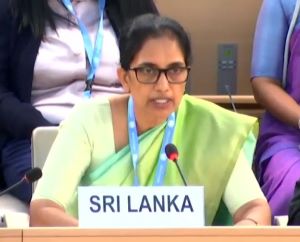
54th Session of the Human Rights Council
Agenda Item 2 - General Debate
Statement by Her Excellency Himalee Arunatilaka, Ambassador and Permanent Representative of Sri Lanka to the United Nations in Geneva
13th September 2023
Mr. President,
Resolutions 60/251 and 48/141 require that the work of this Council and the OHCHR should be guided by the principles of universality, impartiality, objectivity and non-selectivity, and constructive international dialogue and cooperation.
Unfortunately, this does not appear to be the case with regard to Sri Lanka.
One such instance in the Written Update is the reference to the investigations on the Easter Sunday Attacks of 2019. It is regrettable that the OHCHR has sought to use incorrect and unsubstantiated information from biased sources in their analysis. As Sri Lanka has repeatedly informed this Council, extensive and comprehensive investigations have been carried out by the GoSL with regard to these attacks including a Presidential Commission of Inquiry, the report of which was submitted to the Parliament. Investigations carried out by the Government authorities were assisted by international professional agencies including the Australian Federal Police, the FBI of the United States and INTERPOL.
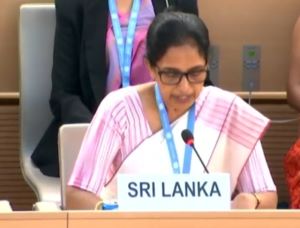
The written update on Sri Lanka was presented at the 54th Session of the Human Rights Council that commenced on 11 September 2023 in Geneva by the Deputy High Commissioner for Human Rights Nada al-Nashif.
Delivering Sri Lanka´s statement as the country concerned, Permanent Representative of Sri Lanka to the United Nations in Geneva, Ambassador Himalee Arunatilaka at the outset reiterated that Resolutions 46/1 and 51/1 were adopted by a divided vote in the Council where the majority of the Member States either opposed or abstained from voting on these Resolutions, in fundamental disagreement with its unacceptable content, in particular the so-called evidence gathering mechanism, the establishment of which is unprecedented.
Sri Lanka rejected the written update by the High Commissioner for Human Rights titled ‘Situation of Human Rights in Sri Lanka’ together with its conclusions and recommendations, while reaffirming its commitment to pursuing tangible progress through domestic institutions.
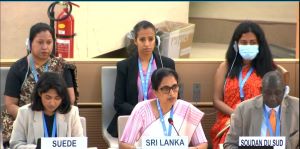
GoSL Statement made by H.E. Himalee Arunatilaka, the Permanent Representative of Sri Lanka to the United Nations in Geneva
54th Session of the Human Rights Council:
Report on Sri Lanka by the High Commissioner for Human Rights
pursuant to HRC Resolution 51/1
11 September 2023
Mr. President,
At the outset, let me reiterate that the Government of Sri Lanka (GoSL) has consistently rejected Resolution 46/1 and 51/1 that led to the setting up of the so-called ‘Accountability Project’. We also reject the written update, its conclusions and recommendations.
We recall that the majority of the Member States either opposed or abstained from voting on these Resolutions, in fundamental disagreement with its unacceptable content in particular the so-called evidence gathering mechanism, the establishment of which is unprecedented. We reiterate that it goes beyond the mandate that Member States conferred on the Council by UNGA Resolution 60/251.


General Intervention by H.E. Himalee Arunatilaka, Ambassador and Permanent Representative of Sri Lanka to the UN in Geneva, on 28 August 2023
Mr. Chair,
Sri Lanka compliments the work accomplished by you as the Chair of this open-ended working group to date, based on the mandate given by General Assembly resolution 76/231. We are thankful to all Member States for their constructive engagement throughout the past sessions towards reaching a substantive outcome of this working group.
Mr. Chair,
Sri Lanka recognizes the common interest of humankind in the exploration and use of outer space for peaceful purposes without discrimination. Sri Lanka has been actively engaging in multilateral efforts for the prevention of an Arms Race in Outer Space (PAROS) over many decades since becoming a signatory to the Outer Space Treaty in 1967. Significantly, Sri Lanka proposed a moratorium on the testing and development of space weapons preceding multilateral negotiations on a treaty to prohibit all weapons in space in 1985.
Intervention by Dr. Samiddhi Samarakoon, National Coordinator, Disaster Preparedness and Response Division of the Ministry of Health on National Inventory of Dangerous Pathogens (NIDP)

Thank you Mr. Chair,
I take this opportunity to brief on the background of the establishment of National Inventory of Dangerous Pathogens (NIDP) in Sri Lanka which is a key step in national implementation of the BWC. Following the Joint External Evaluation of International Health Regulations (IHR) implementation in 2017, while acknowledging the several activities that were undertaken to improve the biosafety and biosecurity in Sri Lanka, it was recommended to develop a National Inventory of Dangerous Pathogens and Toxins (NIDP) as well to further strengthen the biosafety and biosecurity in the country.
Thus, action was undertaken to develop the National Policy on Biosafety and Biosecurity, including policy statements required to satisfy the 15 Articles of the BWC; appointing two contact points including the National Coordinator, Disaster Preparedness and Response of the Ministry of Health. The Disaster Preparedness and Response Division (DPRD) of the Ministry of Health applied for extended assistance from the UNODA for implementation activities of BWC and BWC-ISU in collaboration with the National Institute of Public Health and the Environment (RVIM), of the Netherlands supported Sri Lanka to develop the NIDP. We are grateful to the Government of the Netherlands and UNODA for this assistance and the European Union (EU) for funding the project.
Intervention by Dr. Samiddhi Samarakoon, National Coordinator, Disaster Preparedness and Response Division of the Ministry of Health on the Implementation of Biological Weapons Convention Plan in Sri Lanka

Mr. Chair,
Thank you for giving me the floor. First of all, I would like to express sincere appreciation of Sri Lanka delegation for your steady stewardship of this Working Group. I also thank the ISU staff and the representatives of other international organizations for their presentations on important topics.
Sri Lanka has also been in the forefront of major initiatives in the field of disarmament and was among the very first countries to sign the BWC in 1972.

Ambassador/ Permanent Representative of Sri Lanka to the World Trade Organization (WTO) in Geneva, Mr. R.G.S Wijesekara presented his credentials to the Director General, Dr. Ngozi Okonjo-Iweala of the WTO on Wednesday, 27 July 2023 at the WTO Secretariat in Geneva.
During a brief meeting at the presentation of credentials, Ambassador Wijesekara conveyed the personal greetings of the Hon Minister of Trade Commerce & Food Security of Sri Lanka to the Director General. He also remarked on the ambitious regional trade reforms agenda of the Hon President that leads to better building block for our multilateral engagements. Ambassador Wijesekara also highlighted the need of 360 degree capacity building initiatives; including from the WTO for better integration of countries like Sri Lanka to the multilateral trading system.

Mr. President
Excellencies
Distinguished Delegates
It gives me great pleasure to present to you the final position of the Government of Sri Lanka on the recommendations received during the 4th cycle of our UPR Report.
The mechanism of the UPR marks the culmination of a long review process of the international human rights machinery. We value the fact that this mechanism provides an equal opportunity for all UN member States, without discrimination, to voluntarily share the progress made domestically to promote and protect human rights. This peer review process has contributed to reducing selectivity and politicization in our efforts to advance the cause of human rights. It enables constructive engagement on developments related to human rights with our international partners, national independent institutions, civil society, and the UN system.

Madam Chair,
Let me congratulate you on your appointment as the chair of this meeting.
Sri Lanka wishes to congratulate Director General Mr Daren Tang and the WIPO Secretariat for making all arrangements to organize this 64th WIPO General Assembly.
Sri Lanka aligns itself with the statement delivered by Indonesia on behalf of the Asia Pacific Group (APG) today and would like to reiterate the importance of ensuring balanced geographical representation in the key decision making bodies of the WIPO.
Sri Lanka has worked in close cooperation with WIPO during the past 10 years in strengthening the IP eco system and capacity building in the country. WIPO Technology and Innovation support centre project is currently being implemented successfully and we have been able to establish 27 TISC centres in the universities and Research Centres.
Enabling IP environment project an initiative by the Asia Pacific Bureau completed 6 years and the stake holder groups have now gained much awareness on IP through this project and currently much attention is given to enhancing commercialization and technology transfer. As a result a special legislation has been passed in implementing an agency to work on this area of work.

The Ministry of Industries and Industrial Development Board organized “Industry 2023”, the National Industry Exhibition with the theme of “Towards export-oriented manufacturing economy” which is the largest national industrial event in Sri Lanka. The exhibition was held from 22nd to 25th June 2023 at BMICH, in Colombo.
Please visit virtual 360 Industry Exhibition at https://vindustryexpo.idb.lk/
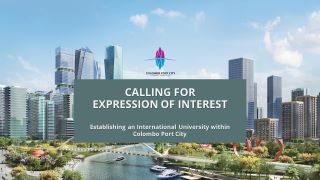
Colombo, Sri Lanka - June 12th, 2023: The Colombo Port City Economic Commission (the "Commission") would like to announce an invitation for Expressions of Interest, in line with the objectives of developing and improving the area of education, with a need to proceed with identifying possible investors for developing an International University within Colombo Port City.
The Development Control Regulations (DCR) has identified a specific plot for this purpose and similar to the requirements for investors in the School and Hospital projects, the Commission seeks an investor with a globally recognized brand and world-class standards for the International University.

Mr. President,
The Government of Sri Lanka is addressing the unprecedented social and economic issues arising from the economic crisis. Political stability has been restored while conditions on the ground have improved considerably for the people. In parallel and despite ongoing fiscal challenges, the Government is continuing its focus on the long-term measures towards reconciliation and accountability within the framework of the Constitution.
The GoSL has been successful in maintaining economic stabilization. The IMF Extended Fund Facility for Sri Lanka was approved recently, and the necessary fiscal, monetary and governance reforms are underway. Social protection measures to mitigate the impact on the poor and vulnerable have also been introduced. The availability of essential items including fertilizer, fuel, medicine and energy has been restored and headline inflation has decreased.
Intervention on the revised draft
Mr. Chair
Thank you very much for sharing this new draft.
Even though many delegations in this room argued for strengthening of the text in order to ensure that centrality of human control is retained in AWS in order to ensure compliance with international law and IHL in particular, we are quite concerned that the text in several ways is now even further weakened to the extent that we run the risk of even previously agreed understandings are backtracked. Our concerns are mainly with paragraph 20 such as deletion of the word ‘anticipation. Which we believe is already an IHL requirement as well as concerns regarding para 21 in this regard.
Adoption of a substantive repot is important for our delegation as much as it is the same for other delegations but we believe that it should be progressive and forward looking in nature.

Thank you Mr. Chair,
Our comments at this point are with regard to paragraph 25 on legal review. It is the understanding of our delegation that legal reviews with regard to autonomous weapon systems should be inline with the already existing obligations under Art. 36 of the Additional Protocol I and that we should not in anyway agree to obligations on legal review for autonomous weapon systems that are weaker than the already existing obligations under Art,36. It is also recalled that most provisions of the Additional Protocols have gained the status of customary international law. We also note that the obligation under Art 36 of the Additional Protocol I finds its basis in article 35 of the Protocol which provides that the right of states to choose means and methods of warfare is not unlimited.
Art. 36 requires to determine whether the employment of weapons, means and methods of warfare would, ‘in some or all circumstances’ be prohibited by international law. In this sense we believe that the legal review process should consider whether the use of an AWS is in compliance with international law “ in some or all circumstance” and we therefore suggest to make this change in the text. We also support the suggestion by the Swiss delegation as well the delegation of Ireland now to delete the words “ seek to” in this section.

On the International Tea Day, the local tea industry is celebrating impressive achievements by the smallholder sector despite facing an array of unprecedented challenges posed by the economic challenges and the currency collapse.
“It goes without saying that the local tea industry has faced many demanding issues, but on this year’s International Tea Day, we want to celebrate the resilience of our smallholder tea growers, who have overcome pandemic adversity to be back on track to reach high profitability levels,” says Niraj de Mel, the Chairman of the Sri Lanka Tea Board.
“The smallholder sector has already achieved so much in terms of sustainability in the past couple of decades that is worth celebrating. This is a new chapter in the story of Ceylon Tea,” he added.

With regard to paragraph 21 on limitations we would like to state at the outset that in our view the purpose of the imposition of these limitations is to ensure ‘ meaningful human control’ in weapon systems on the premise that autonomy in weapon system cannot be unlimited. We do not agree with the argument that the limitations imposed during the stages of development, deployment and use go beyond the existing IHL requirements. To the contrary these limitations are essential to ensure meaningful human control is retained in weapon systems which would be the only way to ensure in turn that these weapon systems in compliance with IHL.
The chapeau of paragraph 21 should refer to international law and to IHL in particular since complexity of these weapon systems pose a challenge not only to IHL but to the broader regime of international law. We also request to remove the qualifier ‘where appropriate’ in this section as these limitations should be upheld at all times. We stress once again the importance of these limitations as well as the prohibitions with regard to autonomous weapon systems codified in the form of a binding legal instrument to ensure their compliance rather than “possible voluntary measures” left for the discretionary implementation of national mechanisms.

As this is the first time my delegation takes the floor, we wish to congratulate you and assures you of our full support as we approach the final stage of this year’s GGE which we believe marks a significant turning point on the future direction on the issue of regulation of the use of autonomy in weapon systems.
In this light we commend the significant efforts you and your team have put on in presenting the draft report of the 2023 session which we consider as a good basis to commence our work for this session.


The Permanent Mission of Sri Lanka to the UN in Geneva together with the Permanent Mission of Thailand co-hosted a commemorative event to mark the International Day of Vesak at the United Nations Office in Geneva (UNOG) on Vesak Full Moon Day, 5th May 2023.
The event commenced with opening remarks by co-hosts, Ambassador Himalee Arunatilaka of Sri Lanka and Ambassador Suphatra Srimaitreephithak of Thailand, highlighting the importance of the day of Vesak to millions of Buddhists around the world.
Ambassador Arunatilaka underlined the key role played by Sri Lanka in gaining international recognition for the Day of Vesak through the resolution adopted by consensus in the UN General Assembly in February 2000, following a proposal tabled by then Foreign Minister, the late Lakshman Kadirgamar, on behalf of 10 countries, titled “International Recognition of the Day of Vesak”.
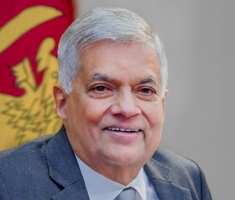
The World Health Day Message
'Health for All'
For the past seven and a half decades, ‘World Health Day,’ has been observed on 7th April under the sponsorship of the World Health Organization (WHO), with the overall objective of raising global awareness on physical and mental health, as well as people's well-being, in a bid to enhance public health conditions. This year’s commemoration is of an augmented significance, with the WHO celebrating its 75th anniversary on the same day. My warm felicitations to Dr Tedros Adhanom Ghebreyesus, WHO Director General and the officials, especially the Representative to Sri Lanka, on this auspicious occasion.
This event presents the possibility for the WHO and others working on overall health issues to be recognized for their selfless service, as well as to seek additional ways and means of extending improved healthcare nationally, regionally and globally. It is undoubtedly a juncture for the WHO to take stock on its successes and strategies on facing challenges to ensure good health universally.
|
WE ARE HIRING Permanent Mission to the UN in Geneva is looking for Personal Assistant(casual) & Clerk/Typist (casual) Must be fluent in English & French Apply before 20.04.2023 Please send CV and covering letter to
|
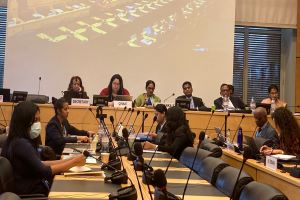
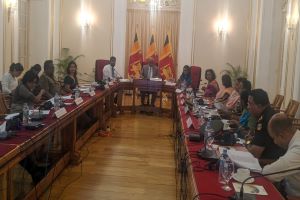
Sri Lanka participated in its 6th Periodic Review under the International Covenant on Civil and Political Rights (ICCPR) on 8 and 9 March 2023in Geneva. The Review was conducted in a hybrid format, during three 2-hour sessions over two days by the Human Rights Committee. The preparations for the Review were led by the Ministry of Foreign Affairs over the past several weeks and included participation by a number of government agencies.
The Human Rights Committee is a body comprised of 18 independent experts that monitor the implementation of the ICCPR. The Reviews of all States Parties to the Covenant are conducted by the Committee. In addition to Sri Lanka the Committee also reviewed Egypt, Turkmenistan, Zambia, Peru, and Panama during its 137th Session from 27 February to 24 March 2023.
In her opening statement, the Head of the Sri Lanka Delegation Permanent Representative of Sri Lanka to the UN in Geneva Ambassador Himalee Arunatilaka, said that since the submission of Sri Lanka’s 6th Periodic Report in 2019, many significant developments in the country have taken place, including the enactment of the 21st Amendment to the Constitution, further strengthening democratic governance through the Constitution, Regulation of Election Expenditure Act, amendments to the Prevention of Terrorism Act and drafting of anti-terrorism legislation, reconciliation through independent domestic mechanisms, convening of an All Party Conference, establishment of a Cabinet Sub-Committee on Reconciliation and release of land held by military for security purposes in the North and the East to the legitimate owners. Ambassador Arunatilaka also pointed out that the period under review posed unprecedented socio-economic challenges for Sri Lanka and the Government’s main objective during the past year was to restore economic and political stability and on delivering urgent socio-economic necessities.

Mr. Chair,
Our delegation commends your leadership in steering our work in the Group of Governmental Experts and assure you of our continued support as we endeavor to advance our work in the GGE.
As a country that has consistently advocated for the importance of centrality of human control in weapons system and the legal, ethical, military as well as security concerns related to autonomous weapon systems we are encouraged by the recent developments and the growing momentum on the call for regulation in autonomous weapon systems. We consider the joint statement delivered at the UNGA last year supported by 70 states on this subject as well as the Communiqué issued at the Latin American and the Caribbean Conference of Social and Humanitarian Impact of Autonomous Weapons more recently calling for “the urgent negotiation of an international legally binding instrument on autonomy in weapons systems” as important steps forward in this regard. We emphasize on the importance of building on these progressive developments to ensure meaningful human control in weapon systems through the development of an international legally binding instrument.
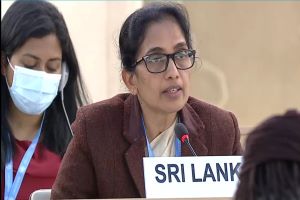
Mr. President,
Distinguished delegates,
I take the floor in keeping with Sri Lanka’s continuing policy of constructive engagement with the UN human rights instruments and mechanisms.
As we mark the 75th anniversary of the UDHR, and the 30th anniversary of the Vienna Declaration and Programme of Action (VDPA), we must resolve to preserve the spirit of multilateralism and the foundation of human rights governance. We must also strive to depoliticize human rights and find solutions to concerns through dialogue and multilateral cooperation rather than through confrontation, selectivity and unilateralism.
Mr. President,
We envisage 2023, the 75th anniversary of our independence, which coincides with the 75th Anniversary of the adoption of the Universal Declaration to be a year of socio-economic stabilization, reconciliation, and recovery.
The domestic institutions for reconciliation and accountability in Sri Lanka continue to carry out their work towards achieving important post-conflict recovery and healing.
A Cabinet Sub-Committee has been established under the Chairmanship of the President, to promote reconciliation among different communities and to address and resolve matters relating to issues encountered by the peoples of the Northern and Eastern Provinces.
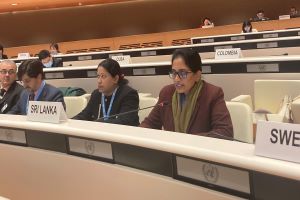
Madam President,
Distinguished delegates,
It is an honour to address this august assembly and to share my country’s perspectives on the work of the Conference on Disarmament, at a time the world is facing myriad of security threats which are at the core of issues discussed at the CD for decades, primarily the threat of nuclear escalation. Other current global security challenges such as transnational organized crime, terrorism, advanced weapon delivery systems add to the dangers associated with the existence of WMD. The situation has heightened the need for progress in global disarmament and the non-proliferation regime which remains the primary purpose of this Conference.
Madam President,
The times are difficult, and our responses require swift action with a sense of collective responsibility, conviction and firm determination. We are deeply concerned about our collective failure to reach a consensus outcome at the 10th Nuclear Non-Proliferation Treaty (NPT) Review Conference, a missed opportunity indeed given our increased vulnerabilities and growing nuclear threats. The implementation of disarmament commitments and obligations have stalled to a great extent, while the expansion and modernization of nuclear arsenals, and the introduction of advanced nuclear weapons continue to take place. We emphasize the equal importance of the three pillars of the NPT; nonproliferation, disarmament, and peaceful uses of nuclear energy and urge for meaningful dialogue to find possible convergence building on our work during the last review conference. Sri Lanka remains committed to the goal of a world free of nuclear weapons, the only guarantee against their proliferation.
Mr. President,
Let me thank you and your team for convening this meeting [thank the panelists] on this very important topic on negative security assurances.
Mr. President, let reiterate at the outset that total elimination of nuclear weapons is the only guarantee against the use or threat of use of nuclear weapons. As stated in our previous statement to this Conference in January this year, we attach utmost priority to the goal of complete and verifiable elimination of nuclear weapons. Negative Security Assurances (NSAs), while it is commonly agreed as an essential legitimate interest of non-nuclear weapon states, is only an interim measure pending the achievement of a world free of nuclear weapons.
Final document of the 1978 First Special Session on Disarmament obliges nuclear-weapon states to “pursue efforts to conclude, as appropriate, effective arrangements to assure non-nuclear-weapon States against the use or threat of use of nuclear weapons”. The topic of NSAs has been in the agenda of the CD since its inception of 1979. We also note the UN Security Council resolution 984 adopted unanimously in 1995 providing pledges on NSAs to nonnuclear-weapon States parties of the NPT in the context of obtaining an indefinite extension of the NPT. Furthermore, the consensus Action Plan of the 2010 NPT Review Conference refers to action points 8 and 9 on NSAs. However, despite discussions that have been continuing in the CD in various forms over the years, we have not been able to conclude a legally binding instrument to effectively assure non-nuclear-weapon States (NNWS) against the use or threat of use of nuclear weapons.